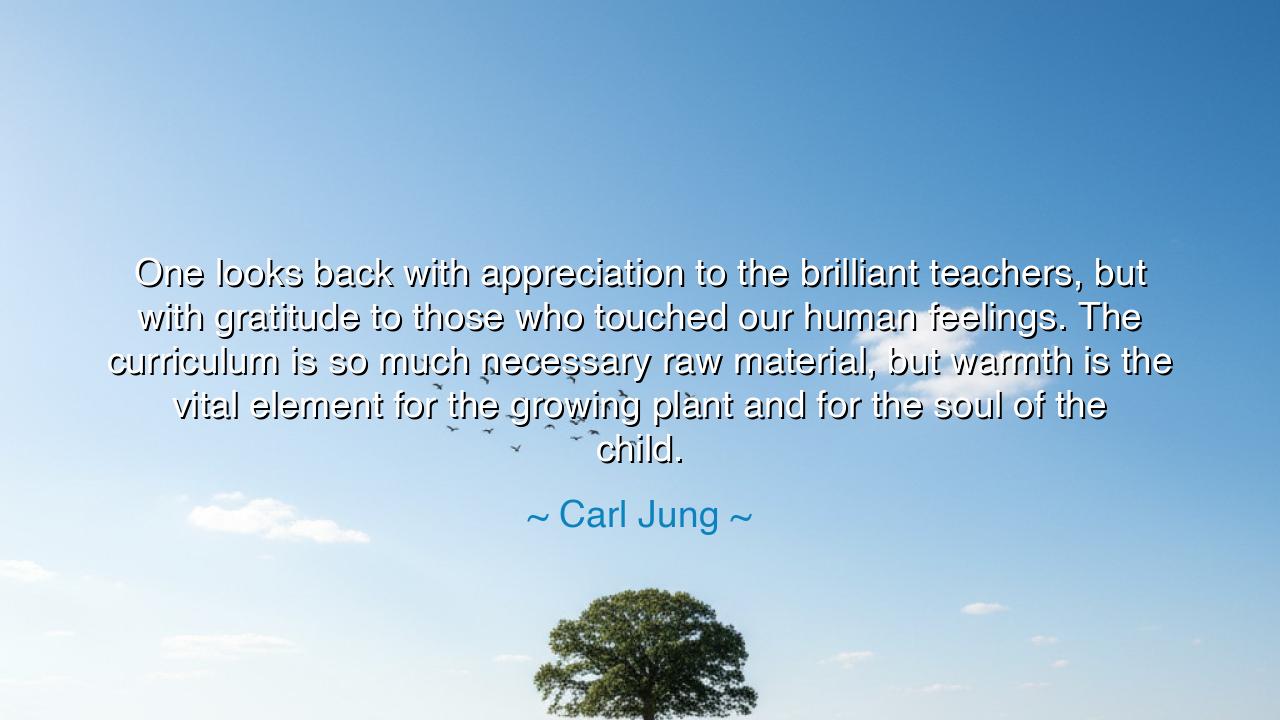
One looks back with appreciation to the brilliant teachers, but
One looks back with appreciation to the brilliant teachers, but with gratitude to those who touched our human feelings. The curriculum is so much necessary raw material, but warmth is the vital element for the growing plant and for the soul of the child.






Hear the wise words of Carl Jung, the great explorer of the soul, who declared: “One looks back with appreciation to the brilliant teachers, but with gratitude to those who touched our human feelings. The curriculum is so much necessary raw material, but warmth is the vital element for the growing plant and for the soul of the child.” These words cut to the heart of education and of life itself, for they remind us that knowledge alone cannot nourish the soul. It is the living warmth of human connection, the touch of compassion, the spark of love, that truly causes a spirit to grow.
The curriculum, with its lessons, its facts, and its disciplines, is indeed necessary. It is the soil, the structure, the raw material from which the mind may draw strength. But soil alone is not enough. Without sunlight, without warmth, no seed will rise, no flower will bloom. So too with the child. He may learn mathematics, languages, and histories, but if his heart is untouched, if his humanity is left barren, then he grows crooked, cold, incomplete. The teacher who brings not only brilliance of mind but also warmth of spirit becomes the true gardener of the soul.
The ancients knew this truth well. When Aristotle taught Alexander, it was not only philosophy that he passed on, but also a vision of the noble life—a sense that greatness is not conquest alone, but wisdom, justice, and honor. Alexander himself said he owed his life to his father, but to his teacher he owed how to live well. This distinction is echoed in Jung’s words: the mind is sharpened by brilliance, but the heart is awakened by warmth.
History offers us the luminous example of Janusz Korczak, the Polish physician and teacher who ran an orphanage during the Second World War. He could have abandoned the children under his care when the Nazis came, but instead he chose to remain with them, guiding them with kindness, stories, and hope until the very end. The curriculum he taught mattered little in those dark days; what mattered was his warmth, which became a shield for their souls. Even as they walked toward the camps, he held their hands, and they trusted him. This is the living proof of Jung’s truth: it is not brilliance, but humanity, that we remember with deepest gratitude.
The meaning of Jung’s words is clear: education is not merely the transfer of knowledge, but the cultivation of life. The mind without the heart is a barren field. The child without warmth is like a plant without sun—stunted, pale, struggling to survive. The true teacher knows that while lessons in arithmetic and grammar may prepare a child for survival, it is kindness, compassion, and encouragement that prepare a child to flourish.
The lesson for us is this: if you would guide others, do not be content with brilliance alone. Be brilliant if you can, but above all, be warm. Let your words not only instruct but heal. Let your presence not only inform but inspire. For the soul remembers those who touched its humanity far longer than those who merely sharpened its intellect. To teach the mind is duty; to warm the heart is greatness.
What, then, are the practical actions? Teachers: see your students not only as vessels for knowledge but as souls yearning for light. Offer them patience, encouragement, and humanity alongside lessons. Parents: remember that your children need more than rules and facts—they need your tenderness, your presence, your belief in them. All of us: when we encounter others, let us not only share what we know, but also share warmth, for every soul is a growing plant, in need of sunlight.
Thus Jung’s words endure as a beacon: “One looks back with appreciation to the brilliant teachers, but with gratitude to those who touched our feelings. The curriculum is raw material, but warmth is the vital element for the soul of the child.” Let us be such teachers, such parents, such companions—that when others look back on their lives, they may remember us not only for our brilliance, but for our warmth.






AAdministratorAdministrator
Welcome, honored guests. Please leave a comment, we will respond soon